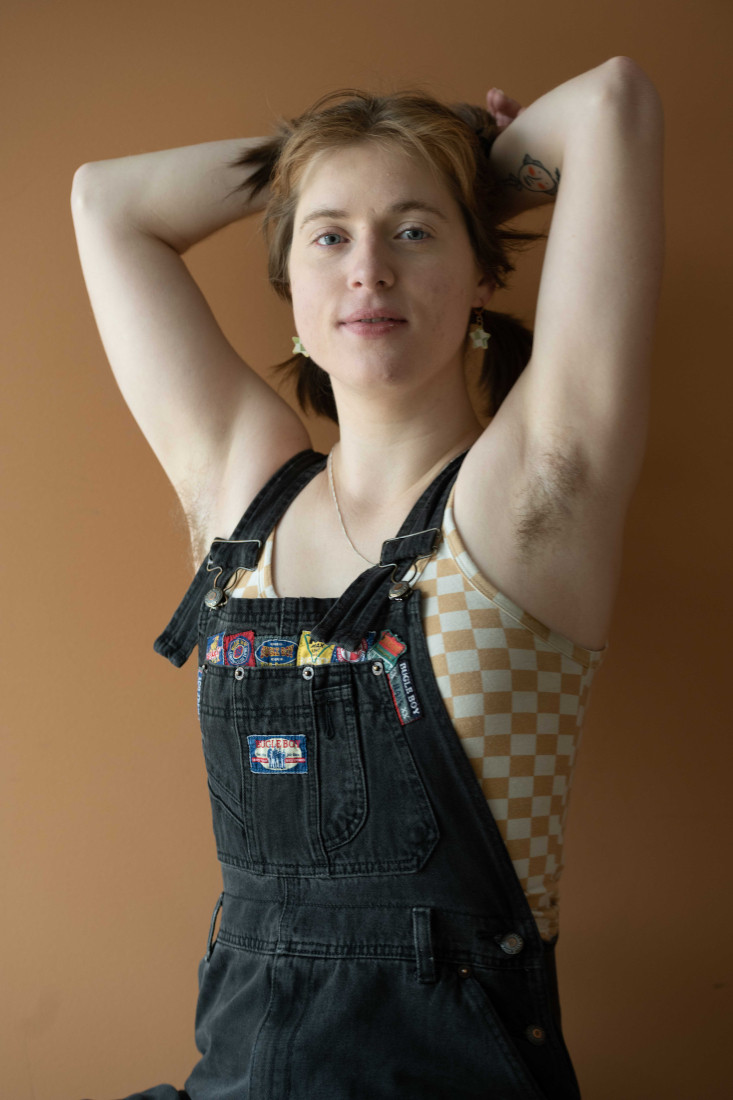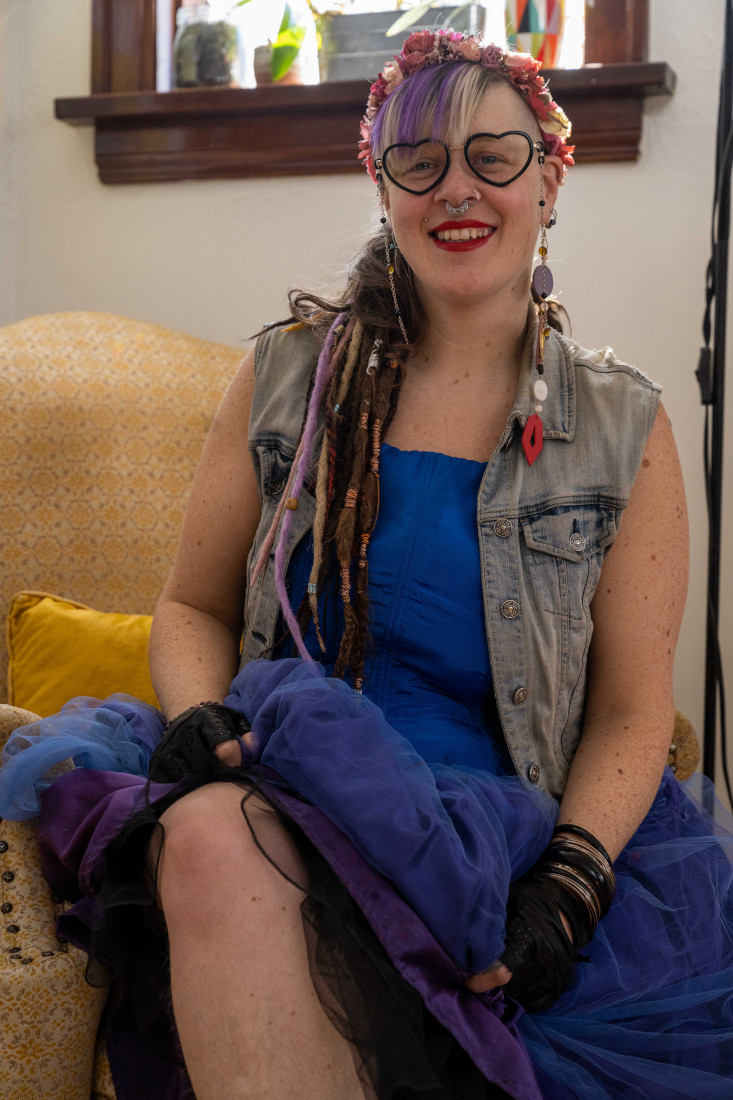Shaving, waxing, tweezing
Body hair, social norms and perceived ‘femininity’
I keep checking under my chin for this one persistent hair that grows in fits and starts. I’ll check every day for weeks and then one day, I wake up and it’s like half an inch long. For just over a year now, I’ve only done some light hair removal on my face. I let everything else grow long and dark. I’m really pale, so my body hair is noticeable. I don’t like how it looks on me, and I worry what other people think, too.
I stopped shaving my legs about eight or nine years ago. My first boyfriend and I had just broken up, it was winter, and I was wearing pants all the time. Who was I even doing it for?
There are lots of body-hair removal methods available today, like shaving, tweezing, threading, waxing, sugaring, laser hair removal and electrolysis. And until recently, I would say I was just lazy. I didn’t want to put in the time, effort or go through the pain and expense of engaging with these practices. Plus, I figured I could be doing literally anything else, like napping or eating.
But Kayla Chafe, a 39-year old cisgender woman, called me out for using that word. People who are socialized as girls are expected to remove certain body hairs. We’re supposed to believe we’re “lazy” if we don’t.
When I stopped shaving my legs, I was also a budding feminist. I was majoring in gender studies and thinking a lot about the patriarchy, the beauty industry and their role in my life. Not shaving was, in some ways, a political statement. It felt really good, but it was scary, too.
First times
When I was a kid, I knew one day I'd get hair on my legs, and I’d start shaving. It was a rite of passage. I’d be a woman, or something. But these first experiences with body-hair removal aren’t always joyful.
The first time I shaved my legs, I shaved my arms, too. I wasn’t sure which parts of my body were unacceptable. I regretted it afterwards when I realized that girls in my classes had arm hair. Ironically, I wore long-sleeved shirts for a while to cover up my hairlessness.
Of course, “The gender binary is very clear on the amount of hair that people should have and where they should have it and where it should be groomed,” Dr. Fiona Green says. Green is a cisgender professor of women’s and gender studies at the University of Winnipeg.
She says people don’t often think critically about the habits and practices we see as “normal.” Even children police each other’s body hair.
As a kid, Sarah Struthers, a nonbinary 24-year-old who goes between identifying as femme and masc, remembers their cousin calling them “‘hairy knees,’ which I was so confused by, because we’re literally kids. And ... I’m thinking of this. I’m conscious of it now.”
Jordyn Wiebe, a cisgender woman, owns The Sugar Freak, which is a sugaring shop in Winnipeg that also sells sex toys and advocates for reproductive rights. Wiebe says, “I knew in school, people were bullied about body hair. So there was one day where I took my mom’s razor, and I actually razored one square out of my arm, just to see what it would look like. And I was like, ‘Why did I do that?”
The expectation to remove hair comes from more than just peers, though.
Struthers says that when they started puberty, their mother and sister noticed their hair growth and asked if they needed to start shaving their underarms. “It was embarrassing ... secretly shaving my armpits," they say.
Wiebe, however, says attitudes toward body hair are likely “more of a generational thing. I don’t know that I’ve had my own peers say anything, but I’ve definitely had family say things when I’m growing out my armpit hair or if my legs aren’t done.”
These pressures and expectations never really go away.
Pressure, expectations
Green says that while growing up in the ’70s, autonomy was a value feminists rallied around, particularly regarding reproductive rights.
“However, it extends beyond that,” she says. Body hair is about “how we want to present ourselves in the world, how we want to be read and understood and how we define ourselves, and that goes with gender (and) sexual orientation.”
Green remembers how societal pressures to shave different body parts intensified in the ’70s and ’80s, with the intention of making women look more childlike. In particular, feminists saw these expectations change in magazines like Playboy and Penthouse, where women’s vulvas “went from being a natural hairy area to being groomed ... and then (the hair) slowly became removed completely.”
By 1985, when Green married, she felt pressured to wax her underarms because of the gendered ritual and performance of marriage. “It was recognizing that I was going to be surveilled, I suppose, by guests at the wedding.” She says she didn’t want to distress anyone.
With the advent of social media and bombardment of advertisements, no one can escape gender norms.
For example, in shaving commercials, Struthers says “their legs are already shaven. The image of a woman with hairy legs is so appalling for the public to see.”
Wiebe, on the other hand, makes social-media posts where she sugars herself. “Some of (the comments) will be like, ‘Oh my god, you had so much hair to begin with.’” She says it’s mostly men who make these comments.
“It’s definitely something people want gone.”
Romance
Until about a year ago, I would constantly get the urge to shave my legs every time I had a new romantic partner. More often than not, I’d give in. That said, when I did shave, I wasn’t only doing it for my partners. Like many people, I like the feeling of soft, silky legs. It’s nice.
My experience is pretty typical. For instance, Wiebe has sugaring clients who come in before dates. “They do it so their first impression with somebody when they’re about to possibly get intimate with someone is that they don’t have any hair.”
Struthers’ past partners have pointed out their body hair. “When I was in my first serious relationships, I started to get comments. One of my boyfriends would say, ‘Your legs are kind of prickly.’ It’s just like, what the heck?”
And Chafe says she felt the need to announce her body hair to partners.
However, sometimes partners help encourage us to be ourselves.
Struthers says, “I was with someone else who was like, ‘You can do whatever you want. It’s your body.’ And that opened my eyes more to like, yeah, it is.
Winnipeg winters, Winnipeg summers
On the one hand, Winnipeg winters are great opportunities to not worry about body hair. Wiebe mentions people who visit The Sugar Freak and say things like ‘Oh, it’s winter. Who cares about my legs right now?”
But the long winters mean there’s less opportunity to work on self-acceptance.
Wiebe says her business is busier over the summer. “People want to remove the hair so that other people can’t see it.”
And that makes sense. After all, “If you’re wearing a bathing suit and there’s pubic hair seen, that’s often frowned upon. That’s seen as disgusting or dirty or poor hygiene,” Green says.
In fact, I’ve somehow trained myself not to gaze at my legs, because every summer, I put a skirt on for the first time, and it’s a big surprise that my leg hair is there. Was it always so long and dark? And I don’t want to get rid of it, and I can’t anyway, because my skin is too sensitive these days, but I certainly don’t feel pretty.
It turns out that removing my body hair and ignoring it have the exact same effect. I still haven’t learned self-acceptance. But I still wear whatever I want. And every time I push through that fear, it gets smaller.
Trans and nonbinary experiences
Transgender women and nonbinary people have different experiences with body hair than me.
Chelsea Howgate, a trans woman, says that before transitioning, she didn’t shave her face. But now, “That’s another source of dysphoria ... Now it feels like there’s a need to shave.”
In Manitoba, trans women who experience body-hair dysphoria can receive health coverage for laser hair removal or electrolysis. “But, unfortunately, laser doesn’t work for everyone. There’s better alternatives, but a lot of those are considered cosmetic rather than a medical necessity, so they aren’t covered,” Howgate says.
She also says it can be difficult to find a trans-friendly clinic. “With waxing ... I would have to go to a salon. And that is giving someone access to a part of my body that I’m still really self-conscious about.”
Howgate points out that feminism has made it easier for trans women to go without shaving. “I can have the kind of body hair that’s starting, in a way, to become more acceptable for cis women to have. Like, sometimes, I’ll go a while without shaving my legs.”
Overall, “Gender non-conforming people exist, and you’re just going to have to deal with it,” Struthers says.
Education and empowerment
With education, people will likely come to think of body-hair removal as a choice.
Struthers has noticed more of their friends have stopped shaving, and Chafe says knowing others who don’t shave normalizes body hair. “It doesn’t really feel like I’m out here alone.”
“It really took some time to decondition myself from what is dubbed as normal,” Chafe says. “I am not doing anything else in life unless it empowers me and it’s my choice fully and not because of systems or culture or people’s opinions.”
Of course, people remove their body hair for lots of good reasons. “People feel sexy ... They feel good about themselves,” Wiebe says. For people with skin conditions like psoriasis, she says sugaring helps because their skin feels less itchy. “It overall helps with their mental health.”
Ultimately, “It is a personal decision,” Green says. “Who am I to tell anybody if they should or shouldn’t be removing their hair? That’s none of my business, and it’s no one else’s business what I do with my body, either.”
Published in Volume 77, Number 22 of The Uniter (March 16, 2023)









